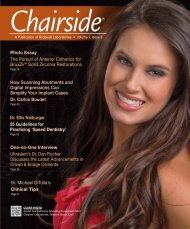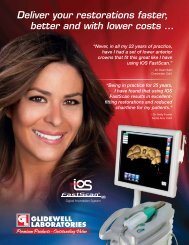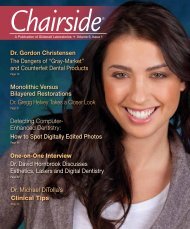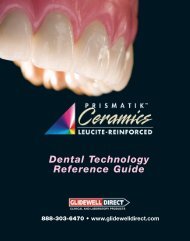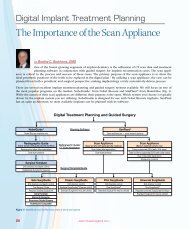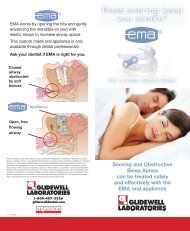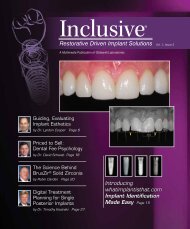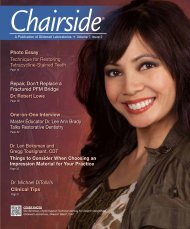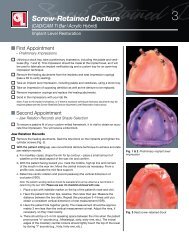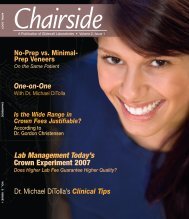PDF Version - Glidewell Dental Labs
PDF Version - Glidewell Dental Labs
PDF Version - Glidewell Dental Labs
You also want an ePaper? Increase the reach of your titles
YUMPU automatically turns print PDFs into web optimized ePapers that Google loves.
check for and to look at in order to stop embezzlement,<br />
or to find out if it’s happening. My approach is a little<br />
bit different. What I tell dentists is that there might be a<br />
thousand different ways to embezzle from their practice,<br />
but regardless of which of those thousand the thief is<br />
using, the way these thieves behave is very predictable. We<br />
already mentioned the people who are in the office alone<br />
at unusual times. You also might consider that employees<br />
who are reluctant to take vacations might have their finger<br />
in the till. So we have what we call the “Embezzlement Risk<br />
Assessment Questionnaire,” which is a scored questionnaire.<br />
If you score at a certain level, it tells you that you either<br />
have very little risk or, conceivably, that you are at high risk<br />
of embezzlement going on in your office.<br />
MD: So are you saying that one type of employee who might be<br />
suspicious is someone who gets two weeks’ paid vacation from<br />
the dentist but never uses it and cashes it out? Or maybe it’s the<br />
person who wants to stay in the office even when everybody else<br />
goes on vacation?<br />
DH: Yes, that’s a symptom. Whether they get cash for their<br />
vacation or not is irrelevant. To me, the real issue is that<br />
they do not want the office open when they are not there.<br />
MD: I see, so they want to be able to cover their trail at any<br />
moment if something irregular is discovered. They probably<br />
worry that if they are gone for a week and somebody starts<br />
digging through the computer that any irregularities could<br />
be noticed.<br />
DH: What uncovers a lot of fraud is patients asking questions<br />
about things. A very common scenario is when a patient<br />
says, “I was in two weeks ago and I paid by cash, but I just<br />
got my statement and it showed that I paid by check.” If that<br />
call comes to the thief, they can squelch it by saying: “Yes,<br />
I know. We just upgraded our computer system and there<br />
are a couple of bugs. The software vendor is working on<br />
it. We’re very sorry it happened.” It doesn’t matter whether<br />
there is one of those calls a day or a hundred, the thief can<br />
make them go away. On the other hand, if the thief is not<br />
in the office and there is someone else getting these calls,<br />
sooner or later that person is going to say to the doctor that<br />
something funny is going on. And then it unfolds. It’s about<br />
control of information in the practice, and the thief can only<br />
exert that control by being there.<br />
MD: That makes sense. They’d probably even insist on taking<br />
all phone calls, right?<br />
DH: That’s right. They’re often the ones who almost lunge for<br />
the phone when it rings. For a dentist who doesn’t suspect<br />
fraud, this looks like a very motivated, committed employee.<br />
MD: Might this employee work on having the best phone skills in<br />
the office, so it only makes sense to have them answer all calls?<br />
“<br />
You’ll see hand instruments and<br />
all kinds of consumables that are<br />
for sale online at a lower price<br />
than you can buy them from<br />
a supplier. Theoretically,<br />
I guess some of this stuff is<br />
gray market that somebody<br />
bought in some other country<br />
and imported. But I think a<br />
vast majority of it just kind of<br />
‘fell off the truck’ in one way<br />
or another.<br />
”



